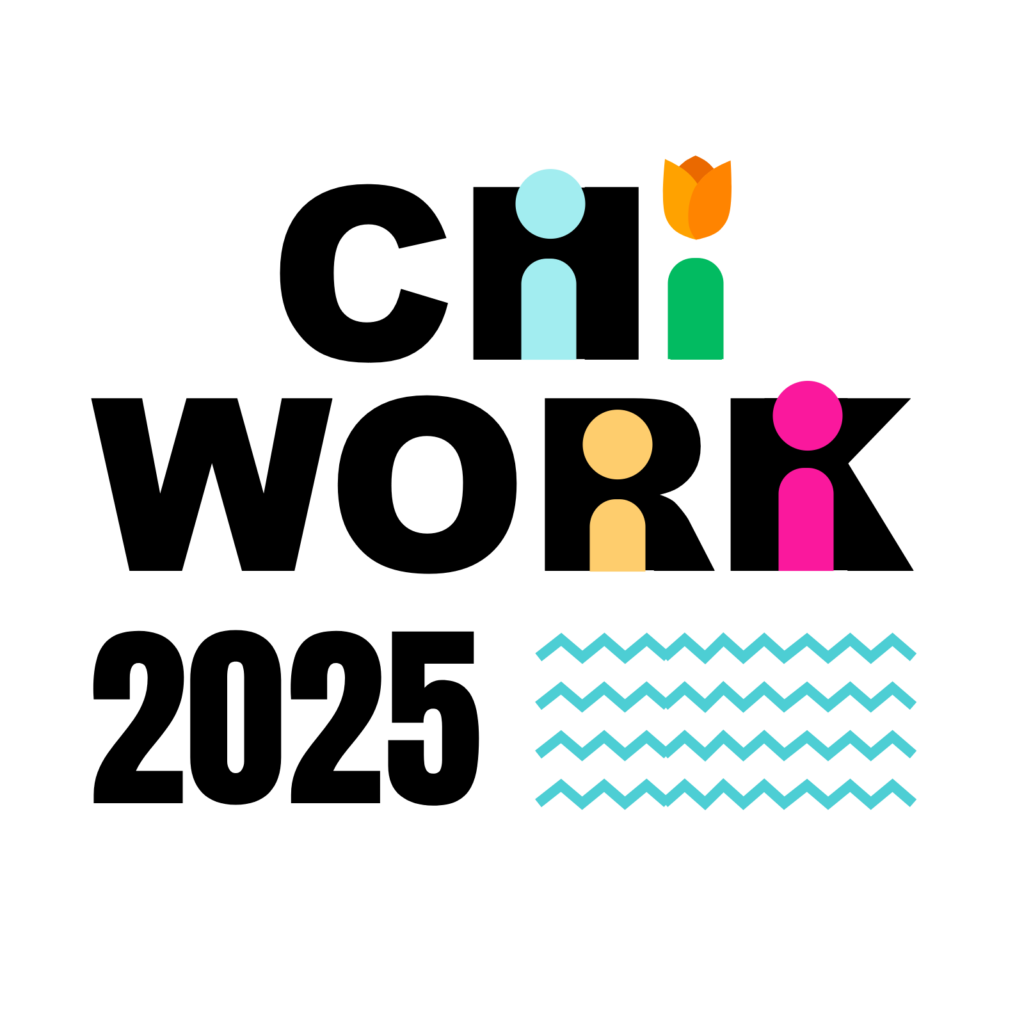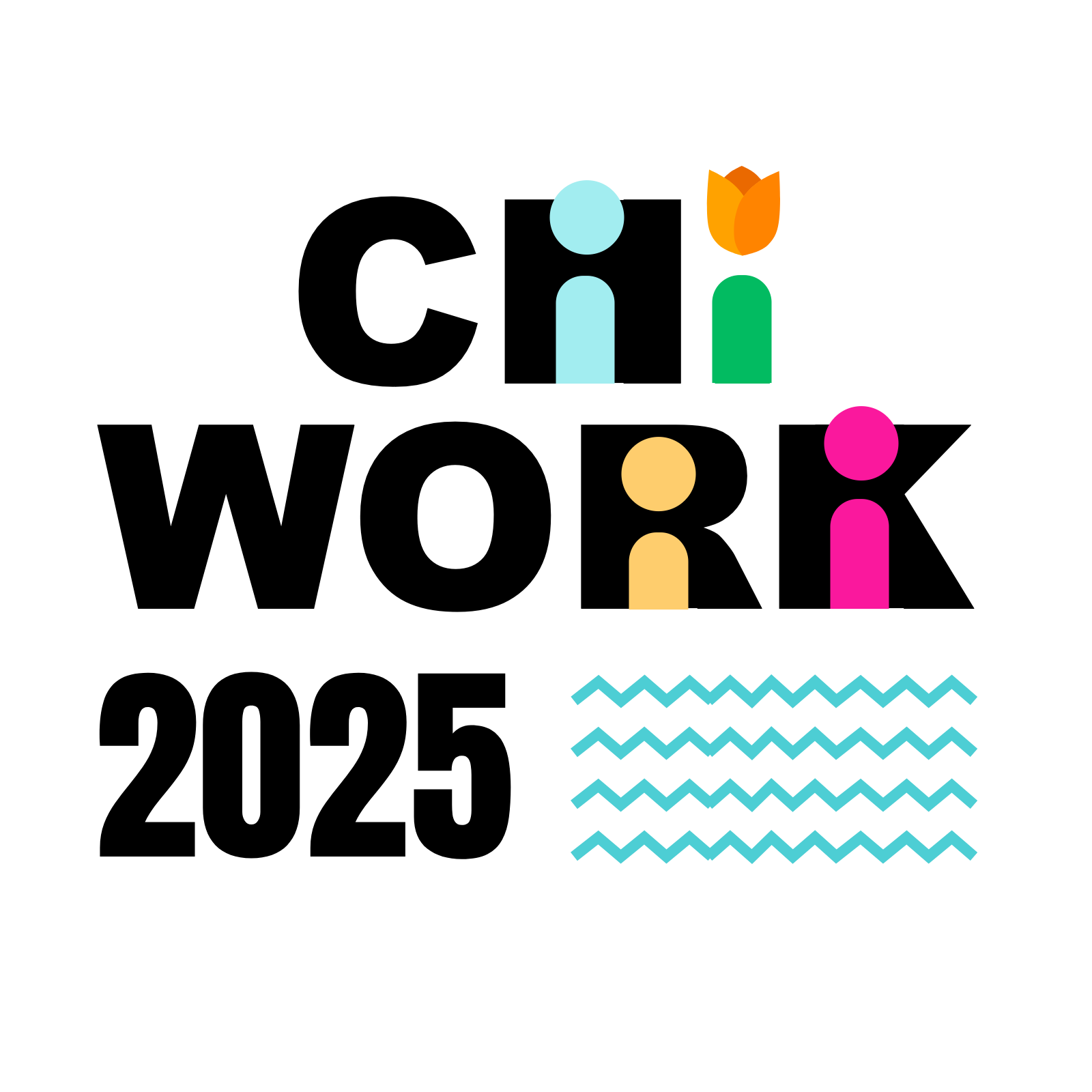We are pleased to invite submissions for the Annual Symposium on Human-Computer Interaction for Work (CHIWORK 2025). CHIWORK 2025 will be a hybrid event. Authors of accepted papers must present their contribution at the CHIWORK conference, either in person in Amsterdam or virtually.
Accepted papers will appear in the Proceedings of the CHIWORK Conference in the ACM Digital Library. Following the new ACM publishing model for conference proceedings, all accepted CHIWORK 2025 papers will be published Open Access. Please consult section “Proceedings and Publication Fees” below to understand the implications
Conference Theme
Threads of Work: Weaving People, Technology, and Purpose
In an era where work is being reshaped by digital innovation, Threads of Work invites us to explore how people, technology, and purpose interlace to create dynamic physical or digital workscapes. This theme celebrates the intricate connections between human values and digital tools, urging us to craft work environments that are not only productive but meaningful and inclusive. As automation, AI, and remote platforms redefine how we connect and contribute, we are called to design with empathy, fairness, and resilience. Join us as we investigate the future of work, weaving new patterns that bridge human potential, technological advancement, and purposeful impact.
CHIWORK’25 welcomes work addressing Human-Computer Interaction for working environments in the broadest possible sense. In addition, we particularly encourage submissions that address the conference theme.
Important dates
All times are in Anywhere on Earth (AoE) time zone. When the deadline is day D, the last time to submit is when D ends AoE. Navigate to the time.is website if you’re not sure.
Submission deadline for full papers: January 31, 2025 (extended) February 7, 2025
Decision notification: March 31st, 2025
Camera-ready version: April 18th, 2025
Submission platform
Please submit your papers on Easychair (https://easychair.org/conferences?conf=chiwork2025) by the submission deadline.
All information can be edited up to the submission deadline. After the submission deadline, no changes will be allowed to the author list and order. Please review the ACM Policy on Authorship for more information
Contribution type and areas
As this community develops, we are looking forward to reviewing a range of paper types, which will all be included in our proceedings. We welcome the following types of contributions, each reviewed on its own merits:
- Research Papers – Describing novel (previously unpublished) research that will be reviewed based upon merits of scientific rigor, originality, and significance.
- Design Fictions – Speculative explorations of future scenarios, assessed for the impact of their provocations and their ability to stimulate discussion. Artefacts supporting the design fiction should be included as an appendix after the references.
- Critiques and Provocations – Bold, unconventional perspectives that challenge prevailing assumptions and spark debate within the HCI for work research community. We welcome thought-provoking critiques, experimental ideas, and radical visions that push the boundaries of work technology design and its societal impact.
- Systems/Tools – Showcasing novel systems that enable new ways of working. These submissions will be evaluated for both the system’s innovation and the depth of implementation details provided.
- Industry Case Studies – Insights into real-world examples of evolving work practices, assessed based on the practical knowledge they offer and their implications for the future of work.
Topics of interest include, but are not limited to:
- Tools for remote work: working from home, working while commuting, and meetings with remote participants
- New ways of getting work done: techniques for interleaving work; easy resumption, engagement, and disengagement; and incorporating well-being needs in productivity tools
- Working and trust with AI and automation: techniques for cooperation and collaboration with AI agents, new tools for task automation, working in and with automated environments and entities including cars, drones, and robots; designing for fairness, transparency and dignity
- Technologies for the future of work: networking, augmented reality, virtual reality, wearable devices, and human-robot collaboration
- Workplace psychology: assessment of human factors in working environments to generate learnings for the HCI communities.
- Supporting worker well-being and health: maintaining work-life boundaries, supporting the physical movement, and facilitating work attachment and detachment, exploring how systems support or privilege the well-being of workers in gendered, race-, caste- and class-informed ways
- Designing digital tools: preparing the ground for professional development and adaptation to and development of individual skills
- Matching and developing worker skills for job opportunities: assessing worker skills, matching existing skills to new job opportunities, platforms and peer-networks for learning new skills
- Inclusion and accessibility: technology that is built for equality and technology that supports all abilities
- Large language models at work: use in practice, risks, organizational and staff perspectives
- Security and privacy: protecting work infrastructure from malicious actors and maintaining privacy while providing personalized support for work and well-being
- Novel ways of measuring outcome: rewarding performance so that it takes into account an individual’s unique needs, incorporating well-being as an integral part of productivity, fostering and measuring creativity and innovation, and supporting self-reflection by workers
- Tools and platforms for hiring and managing workers: new models for hiring, onboarding, and management; understanding and supporting freelancing, on-demand, crowdwork, and gig work
- Societal impact: supporting decision-making for policy and regulation, integrating perspectives of workers, firms, governments, and communities; addressing the economics and resilience of individuals, communities, and society
Preparing your submission
Paper length and format
Authors are invited to submit papers of a length commensurate with the contribution (minimum 6 pages). There is no upper page limit; we encourage comprehensive literature reviews and complete appendices or supplementary material for transparency. As an indication, the length of typical submissions is approximately 7,000–10,000 words excluding references, figure/table captions, and appendices.
Papers should be formatted in accordance with the single-column ACM SIGCHI format. Online guidance is available: https://www.acm.org/publications/authors/submissions.
Templates are available for the following platforms:
- Overleaf (Latex) (or search for ACM Conference Proceedings Primary Article)
- Microsoft Word
- LaTeX (Use sample-manuscript.tex for submissions, and use \documentclass[manuscript, review, anonymous]{acmart}.)
Reviewers will review the papers in the single-column format. Accepted papers will later be processed and transformed into the ACM double-column publication format. Contact authors of accepted papers will receive instructions on how to prepare and submit a final version by the Publication-Ready Deadline.
Responsibility for obtaining permission to use video, audio, or pictures of identifiable people or proprietary content rests with the author, not the ACM or the CHIWORK conference. Please anticipate that formal permission for each third-party content used in the submission will be requested at the publication-ready deadline.
Inclusivity
Authors should ensure their work and writing are as inclusive as possible; where this is not possible, it should be acknowledged. For example, authors should use gender-inclusive language when developing their papers (see e.g., HCI Guidelines for Gender Equity and Inclusivity) and consider what communities their work is – and is not – supporting, as well as their geographical context.
Anonymization policy
Papers should keep the identities of the authors hidden – please remove all identifying information from the text and metadata, and please cite your own work in the 3rd person. This includes identifiable information in the Method section (location where the study is conducted), acknowledgements (grant number of funding agency, names of colleagues).
Peer-reviewing process
Papers will be assessed following a double-blind peer-review process, receiving at least 3 reviews. The selection process will follow a single decision program committee meeting. Submissions will require at least two positive reviews to be accepted.
Will be considered for desk rejection papers that are incommensurate with their contributions, not properly anonymized, not formatted according to the recommended template, or out of the scope of the conference.
Proceedings and publications fees
At least one author of each accepted paper needs to be registered to the conference and must present their contribution at the CHIWORK conference, either in person in Amsterdam or virtually.
Accepted papers will appear in the Proceedings of the CHIWORK Conference in the ACM Digital Library. Following the new ACM publishing model for conference proceedings, all accepted CHIWORK 2025 papers will be published Open Access.
Many authors will qualify for free OA publishing, while others will be required to pay an applicable article processing charge (APC). If you are the corresponding author of a CHIWORK submission, please follow the steps on the ICPS website (https://www.acm.org/publications/icps/author-guidance)prior to your submission to determine whether you will be required to pay an APC. This is a condition to the acceptance of your paper, and no exception will be made.
Important notice: The payment deadline for applicable APCs is 45 days prior to the start of the conference. The co-authors on a paper are jointly responsible for ensuring timely payment of the applicable article processing charge (APC) for that paper. If the APC remains unpaid 90 days after the initial due date, all authors on the paper will be prohibited from contributing to any ACM venue (including ACM journals, conferences, magazines, and books) until the payment is completed.
Important update on the new ACM open access publishing model for ICPS!
ACM has introduced a new open access publishing model for the International Conference Proceedings Series (ICPS). Authors based at institutions that are not yet part of the ACM Open program will be required to pay an article processing charge (APC) to publish their ICPS article in the ACM Digital Library, unless one of their co-authors’ institutions is a member or they qualify for a waiver. To determine whether or not an APC will be applicable to your article, please follow the detailed guidance here: https://www.acm.org/publications/icps/author-guidance.
For 2025 ACM is providing a subsidy on APC pricing for ICPS, as follows:
- The 2025 subsidized APC rate for ICPS papers will be $350.
- For papers where any of the authors is a member of ACM, the APC rate will be $250.
- For ICPS papers whose corresponding author is based in a lower-middle-income country, the APC rate will be $175.
- For ICPS papers whose corresponding author is based in a lower-middle-income country and where any of the authors is a member of ACM, the APC rate will be $125.
- For ICPS papers whose corresponding author is based in a low-income country, no APC is required.
The subsidized pricing will apply to all papers that are processed through the ACM eRights system from 12:00 noon (US Eastern time) on March 6, 2025. Please note that ACM will not be providing refunds for APCs that have already been paid at that time.
Further information may be found on the ACM website:
- Full details of the new ICPS publishing model: https://www.acm.org/publications/icps/faq
- Full details of the ACM Open program: https://www.acm.org/publications/openaccess
Technical Program Chairs
Carine Lallemand – University of Luxembourg and Eindhoven University of Technology
Philipp Wintersberger – Interdisciplinary Transformation University, Linz, Austria
Erin T. Solovey – Worcester Polytechnic Institute and Harvard University, USA
For questions, please email papers@chiwork.org

